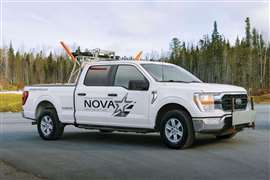Hands across the water
14 January 2009
That standard, EN 13000, is scheduled for revision in January 2009, with implementation to take place by 1 January 2010 for mobile cranes bearing the CE mark. The CE mark indicates that the product carrying it complies with all relevant European requirements, and that the compliance has been assessed according to applicable certification procedures.
The revised standard calls for the replacement of the standard override key on capacity limiters for mobile cranes with a set-up button. The button would allow the crane to be rigged and de-rigged but, in operation, override of the rated capacity limiter would be impossible in conditions where there is a load chart.
In deadlock situations, the crane operator could press the set-up button to increase the shut-off limit to 110% of the load chart until the crane is returned to normal operation. Pressing the set-up button, however, would reduce crane speed to 15% of maximum. A data logger, often known as a "black box" would record details, for example, the number and frequency of crane overloads. This information could be used to evaluate accidents and avoid future accidents, according to FEM.
The revisions reflect a compromise with health and safety administrations in countries including France, Germany and Italy. The government officials, arguing that operators could too easily override a crane's safety system by simply turning a key, objected to the override keys. Consequently, they refused to entirely confirm EN 13000 in 2005. After several years of discussion, FEM finally made the changes to gain their approval.
The response, however, was less than enthusiastic in the United States when the SC&RA Crane & Rigging Governing Committee learned of FEM's plans during the Association's January 2008 Board & Committee meetings, 6-9 January, in Maui, Hawaii. During that meeting, the committee formed the EN 13000 Task Force to research, discuss and respond to modifications to the standard.
A month later, the Task Force issued a position paper, calling for the industry to "stand united to defeat these recommended amendments." It was noted in the SC&RA position paper that: "Eliminating the standard override key would not result in safer crane operations but could, in fact, result in serious consequences. The override key is provided, among other functions, to assist operators and provide them with an efficient and timely way to avoid and/or correct a dangerous situation."
The position paper was particularly critical of the 15% crane-speed reduction resulting from use of the set-up button. It put forth the scenario of an operator lifting a steel beam, working well within the crane's load chart: "Suddenly a gust of wind blows the beam, causing it to exceed the radius of the load chart, putting the crane in an overload situation and cutting off the lifting function. A qualified operator would quickly lower the load. If his operating speed is reduced to 15%, it reduces his control over the crane, which could result in a tipping or failure situation."
This issue was further addressed at March's ConExpo exhibition in Las Vegas. During two meetings with FEM members, SC&RA representatives explained their viewpoint concerning the serious safety hazards that EN 13000 would create.
"Initially, FEM disagreed with SC&RA's position and stated the passage of the standard was a ‘done deal,'" recalled Joel Dandrea, SC&RA executive vice president. "After much discussion, however, FEM members agreed that "perhaps, in their quest to satisfy European safety officials, they did not take a broad enough look at the situation and the impact on the industry.."
Some of the liveliest discussion at April's SC&RA Annual Conference in Florida, US, concerned the European standard. EN 13000 Task Force chairman Robert Weiss, Cranes, Inc., summed up the controversy in a standing-room-only meeting by saying, "We think EN 13000 is unsafe. They think it is safe. We want to convince them they are wrong."
In addition to safety considerations, related business concerns also commanded attention during the Annual Conference. Weiss explained that, at the request of the SC&RA EN 13000 Task Force, European manufacturers agreed to sell cranes to the United States without the CE markings for the foreseeable future.
Doug Williams, Buckner Companies, who was finishing his term as SC&RA president, expressed concern about what that meant for the used equipment market. "If the rest of the world accepts the European standard and it becomes the norm, how do we sell the crane back out of the country?" he asked.
Weiss explained that, most likely, a manufacturer or dealer would need to then retrofit the machinery to make it acceptable for resale in Europe. Although it is unclear how much such changes would cost and how long they would take, Weiss seemed confident that relatively simple, inexpensive solutions would emerge to meet the industry's changing needs.
Perhaps meetings such as the one to be hosted by Liebherr-Werk Ehingen in November will help the industry worldwide move toward greater safety and efficiency. FEM also has invited representatives from ESTA (the European Association of Heavy Haulage, Transport and Mobile Cranes) and CICA (the Crane Industry Council of Australia), who will be called upon for their support in finding a compromise concerning EN 13000.
In addition to Beth O'Quinn, SC&RA vice president-crane & rigging, members of the SC&RA EN 13000 Task Force planning to attend the meeting include: Robert Weiss, Cranes, Inc.; Frank Bardonaro, AmQuip Crane Rental LLC; George M. Bragg, Bragg Crane Service; Lynn Dietrich, Manitowoc; Randy Harris, All Erection & Crane Rental Corp.; Ronald Schad, Essex Crane Rental Group; and SC&RA assistant treasurer Bill Stramer, Link-Belt Construction Equipment, Inc.
"We are sending over a very impressive delegation. SC&RA is being represented by an extremely well-qualified group of members who will work with our international counterparts for the best collective interest for the industry," said Dandrea. "Their efforts will also mesh perfectly with the goals and objectives in our current strategic plan to expand SC&RA's international presence. Without a frank exchange of views, we could never find common ground."
Further emphasising the SC&RA commitment to the worldwide specialized carrier and rigging industry is the Association's International Forum, 3-13 November. While SC&RA meets FEM in Germany, other SC&RA members from the United States will be meeting their fellow members in Australia and New Zealand. The programme is being conducted in co-operation with the Crane Industry Council of Australia, the Crane Industry Association of New South Wales, the New Zealand Heavy Haulage Association and the Crane Association of New Zealand.
Enthusiasm is also building for the World Crane & Transport Summit, planned for October 2009 in Amsterdam. KHL Group, publisher of this magazine, is planning this event with SC&RA and ESTA, CICA, CRAC (Crane Rental Association of Canada) and other leading associations in the world crane and transport market. Harmonisation of equipment regulations is among the topics to be explored during that event.






